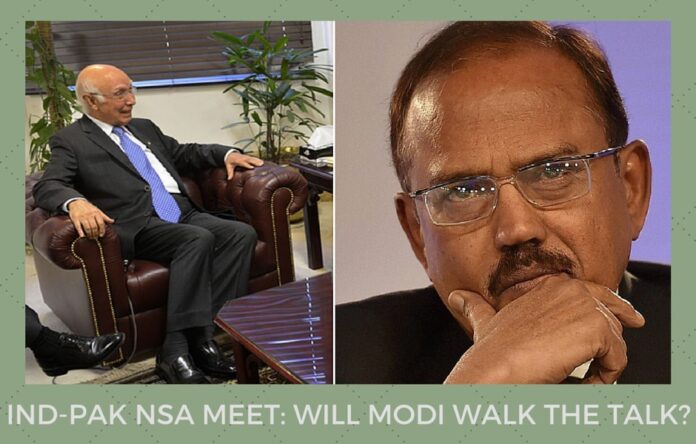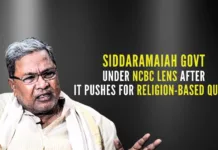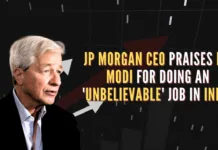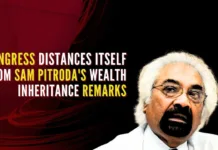
Navin Upadhyay
New Delhi
With Pakistan army continuing its shelling of civil population in Poonch in Jammu region and its High commission here inviting Kashmiri separatist leaders for holding discussion with them ahead of scheduled talks between Pakistan National Security Advisor Sartaj Aziz and his Indian counterpart Ajit Doval, the Modi Government has come under intense pressure to cancel the bilateral dialogue.
However, sources in the Government said that India was not ready to abandon the talk at this stage and give Pakistan the chance to blame it for going back on the understanding reached between Prime Minister Narendra Modi and his Pakistan counterpart Nawaz Sharif in Ufa in Russia recently that both sides should resolve all outstanding issues through dialogue. The decision to hold the NSA level talk was also reached at Ufa.
The Modi government has all along said that Pakistan must abjure cross border firing, end sponsoring terrorism, and stop indulging Kashmiri separatist leaders if it wanted to create a conducive atmosphere for resumption of talks.
In the midst of disquiet within its ranks over holding talks when Pakistan was doing everything possible to humiliate India, voices have already begun to surface against the resumption of the dialogue process.
Senior BJP leader and former External Affairs Minister Yashwant Sinha has openly opposed the proposed NSA level talks between the two countries saying it would be a ‘dialogue of the deaf’ and ‘no outcome’ should be expected from this.
Former Information and Broadcasting Minister and senior congress leader Manish Tiwari has already demanded that India should cancel the talks and cut off all the contacts with Pakistan until Pakistan did not stop ceasefire violations.
The Vishwa Hindu Parishad has also called for cancelling the talks, but they are not taken seriously by the government.
The Government is under obvious pressure because it has all along maintained that talks and terror cannot go on simultaneously. This motto has been the cornerstone of the BJP’s policy vis-à-vis Pakistan for decades. During the Lok Sabha election campaign last year, Narendra Modi took the same line. He went a step further by asserting that for every Indian jawan killed by Pakistan that nation will have to mourn the death of 100 soldiers. .
Modi never missed a chance to blast the previous Manamohan Singh government for its supine and cowardly response to both Pak-sponsored terrorism and border skirmishes. A powerful orator, Modi was able to convince the nation that a BJP-led government In Delhi would send the right signal to the mavericks in Islamabad not to taste India’s ‘patience’.
But 15 months down the line, as New Delhi prepares for talks between National Security advisors of the two countries on August 21-22 Pakistani guns are booming at the Line of Control in Poonch and Rajouri and thousands of Indian civilians have been forced to flee their homes. So far six civilians have lost their lives in heavy shelling by the Pak rangers and army men, who are using 120 mm mortar cells and especially targeting the civilians. But desperate to go ahead with the talks, the Indian side is not doing anything to escalate the tension. So, unlike in January when Pak was given a befitting reply by the Indian army for its repeated ceasefire violations, this time the Indian response has been muted.
The government did summon Pakistan envoy and convey its displeasure over the border situation, but an unfazed Pakistan blamed India for border tension.
The Prime Minister has not even reacted to the alarming situation on the border. This despite the fact that even on Tuesday night Pakistani army rained 120 mm and 82 mm mortars on civilian population in Balakote sector of Poonch and several regions of Rajouri.
In addition to the ceasefire violations, Pakistan has also stepped up terror activities. For the first time in eight years, Pakistani militants struck in Punjab on July 27 when three terrorists attacked a passenger bus and stormed a police station in Dinanagar killing seven persons including a Superintendent of Police. Such attacks are taking place at regular interval in Jammu and Kashmir.
In the run up to the talks, Pakistan has rubbed more salt into India’s wounds by deciding to invite separatists leaders from the valley to meet with Pak NSA Sartaj Aziz in Delhi, Pakistan’s deputy high commissioner Mansoor Ahmad Khan reportedly telephoned Hurriyat hardliner Syed Ali Shah Geelani, Mirwaiz Umar Farooq and Yasin Malik and invited them to attend a reception in honour of Aziz in Pak embassy in New Delhi. The separatist leaders have already accepted the invite.
This has created a situation where the Modi government can proceed with the dialogue process only by swallowing its pride and inviting strong reaction from political parties. The Modi Government had called off the foreign secretary-level talks in August last year after the Pakistan high commissioner similarly hosted the separatists. At that time the Government said that there was no place for any “third party’ in a bilateral issue, and told Pakistan that such indiscretion will not be entertained in future.
But even after India called off the secretary level talks, Pakistan went ahead and invited the separatist leaders to its embassy in Delhi to mark the Pakistan day celebration on March 23. It also led to a major row when Minister of state for External affairs General VK Singh, who represented the government of India at the function in the present of the separatist, tweeted that:
#DUTY
The force that binds one morally or legally to one’s obligations– Gen V K Singh, Minister of State for External Affairs
On the same day, while greeting Nawaz Sharif, Modi told him on phone that terror export from Pakistan must stop for a starting a fruitful dialogue process between two the neighbors. The PM also drew the attention of Sharif to the gathering of the separatist leadership at the function hosted by Pakistan High Commissioner Abdul Basit, and asserted again that there was no role for a third party in Kashmir.
Later, in an official reaction MEA spokesman Syed Akbaruddin said: “The Government of India prefers to speak for itself. There should be no scope for misunderstanding or misrepresenting India’s position on the role of the so-called Hurriyat. Let me reiterate there are only two parties and there is no place for a third party in resolution of India-Pakistan issues.”
The NSA-level talks were finalized at Ufa in Russia during a meeting between Modi and Sharif on the sidelines of the Shangahi Cooperation Organisation Summit where they agreed collectively to ensure peace and promote development. Both leaders condemned terrorism in all its forms and agreed to cooperate with each other to eliminate this menace from South Asia. Incidentally, there was no mention of the Kashmir dispute in the statement issued by the nations.
The India government was quick to hail it as a major breakthrough and victory, but under obvious pressure from the ISI, Pakistan is now doing everything possible to derail the talks. If the Modi government still went ahead, there are a series of reports that hundreds of terrorists are gearing up to launch major offensive on India position ahead of the talks.
Now, all eyes will be on Prime Minister Narendra Modi. Will he walk the talk and cancel the NSA level talks and direct the army to silence the guns from across the border?
If he did not do that and the government went ahead with the talks despite such extreme provocation, speculation will gain currency that foreign powers were putting pressure on India to engage with Pakistan.
- Subramanian Swamy approaches Supreme Court on Govt’s modification of 2G Scam Judgment to avoid auction of Satellite Spectrum - April 23, 2024
- Defence Minister Rajnath Singh visits Siachen. Reviews military preparedness - April 22, 2024
- Amit Shah’s shares in the Stock Market almost doubled in the past five years - April 21, 2024










